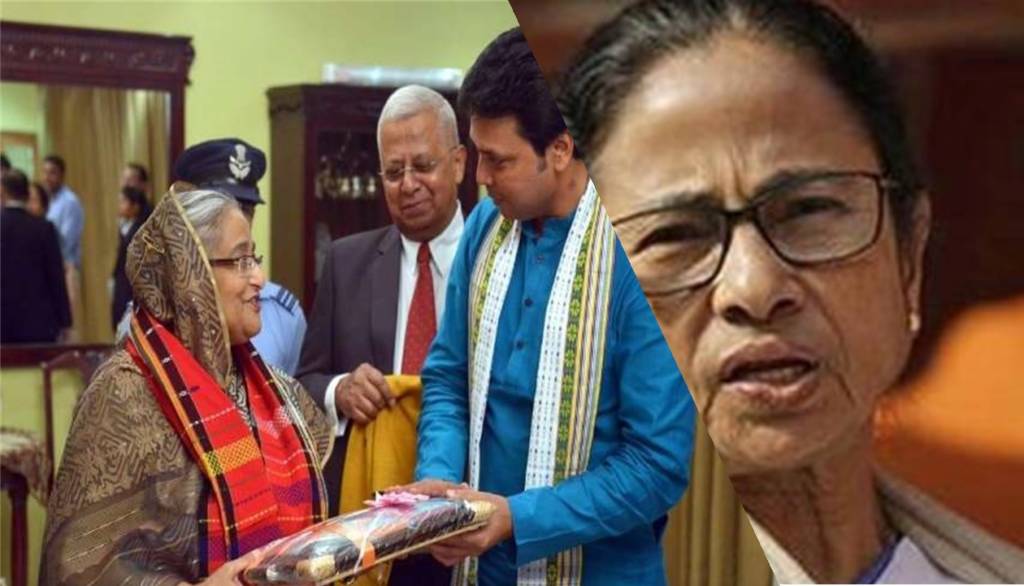In what marks a markedly positive shift in Indo-Bangladesh relations, Tripura CM Biplab Deb reportedly flew to Delhi on Thursday to receive the Bangladesh PM, Sheikh Hasina after the latter requested a specific meeting with the Tripura CM.
It must be noted that the Indian state of Tripura shares borders with Bangladesh. India has therefore found a Bengali speaking leader in Biplab Deb in its pursuit of closer ties with the neighbouring country of Bangladesh.
It is important to mention here that with Sheikh Hasina at the helm of affairs in Bangladesh, India has enjoyed close ties with the neighbouring country. The Bangladesh PM has been no less than a valuable ally for India in the region.
The way she and her government has supported India on the issue of cross border terrorism, stand testimony to her pro-India attitude.
However, India and Bangladesh have not been able to share the kind of warmth that they are expected to manifest in their ties largely because of the hot and cold relationship between West Bengal CM Mamata Banerjee and the Bangladesh Prime Minister over the Teesta Water treaty.
West Bengal and Bangladesh share a long-standing historical and cultural affinity. Bangladesh is a Bengali speaking country and its liberation from Pakistan was largely based on the massacre carried out by Pakistani Army out of linguistic prejudice.
It is only natural for West Bengal and Bangladesh to share a strong bond and thereby bolster Indo-Bangladesh relations. However, the not so warm relations between Mamata Banerjee and Hasina over the Teesta Water sharing pact have come in way of close Indo-Bangladesh co-operation based on historical bonds.
Teesta river flows from the Indian state of Sikkim to West Bengal and then to Bangladesh. The sharing of the river water was decided on a certain level and the central government too was on board to go ahead with the agreement. However, the West Bengal CM Mamata Banerjee doesn’t want the treaty to get through and she has not even been subtle in her resistance to the Teesta water-sharing pact. Even this year, the TMC supremo expressed her reluctance towards the Teesta water treaty in the West Bengal legislative assembly.
Bangladesh PM Sheikh Hasina, on the other hand, has expressed her keenness in the past towards the conclusion of the Teesta water-sharing pact with India. Only last year, she had said that the failure to reach Teesta Water sharing pact remains the lone point of ‘dissatisfaction’ in the bilateral relations between her country and India.
She had even expressed the expectation of the Teesta logjam being resolved. However, she had added, “But Didi (Mamata Banerjee, Chief Minister of West Bengal) didn’t give water.” Moreover, she had also made it clear that she understood the fact that the Indian government cannot resolve the issue till the state government (viz. West Bengal government) agreed to it.
From what the Bangladesh PM said last year, it is amply clear that even Hasina looks at India as a crucial ally in her country’s growth story. However, she doesn’t share a comfortable relationship with the TMC supremo Mamata Banerjee on account of the latter’s stiff opposition to the Teesta Water treaty. And that has been acting as a major hindrance in the bilateral relations between India and Bangladesh.
It, therefore, does not come as a surprise that Bangladesh PM Hasina has found a valuable ally in Tripura CM Biplab Deb, who represents a Bengali speaking state that can potentially share a very strong cultural and linguistic affinity with Bangladesh.
With the development of the Tripura Chief Minister receiving the Bangladesh Prime Minister at Delhi, it is clear that Biplab Deb has emerged as a more popular Bengali-speaking leader than his counterpart in West Bengal.
Now, as Biplab Deb fills the vacuum of a popular Indian Bengali-speaking leader bolstering Indo-Bangladesh ties, we can expect a far greater level of closeness and warmth in the bilateral relations between the two countries.
As such Bangladesh, the country with which India shares its longest international boundary, has shown tremendous potential in the recent past.
With a population of over 16 crores, the Sheikh Hasina led dispensation in the country has boosted its economic growth to a stunning rate of over 8 per cent.
India is already fast emerging as a global economic power. Together, the two countries can forge close ties and set a new, solid narrative in the subcontinent. The volume of trade between the countries has already reached around $ 10 billion.
Last year, Bangladesh also emerged as the eighth largest export destination with the level of exports touching 8.8 billion dollars. Imports into India also crossed 1 billion dollars for the first time last year. This shows the tremendous potential of bilateral co-operation that the two neighbours share.
With Tripura CM Biplab Deb set to enjoy the centre stage as far as the strengthening of Indo-Bangladesh ties are concerned, he would emerge as a crucial point of contact with the Sheikh Hasina government of Bangladesh.
This would pave the way for more Bangladesh’s more prosperous deals and economic engagement with Tripura, glimpses of which can already be seen with an in-principle meeting of minds on a direct flight between Dhaka and Agartala.
This is bound to go down as a brilliant diplomatic initiative that will end up sidelining the West Bengal Chief Minister Mamata Banerjee and paving the way for warmer bilateral ties between India and Bangladesh.
